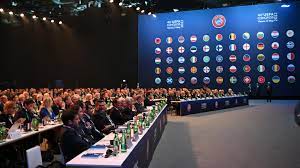By Andrew Warshaw
February 6 – Potential opposition to UEFA president Aleksander Ceferin’s leadership appears to be dwindling ahead of the organisation’s annual congress in Paris on Thursday.
One of the most influential members of Ceferin’s inner circle, Director of Football Zvonimir Boban, stepped down last month protesting about a change in the statutes that would let Ceferin stay in office longer than the current rules permit, possibly until 2031.
It was subsequently mooted that Romanian football chief Răzvan Burleanu, a Fifa Council member, was leading efforts to weaken Ceferin’s power base. But the Romanians have now confirmed they will vote on Thursday for the proposed changes which would allow Ceferin to run again and extend his leadership by more than 12 years.
Although he commands solid, widespread support with UEFA’s membership, Čeferin has made a section of his support uncomfortable in recent months, not least with his backing for Russia’s youth teams to be brought back into international competition.
That plan was swiftly axed following a backlash amongst around a dozen of UEFA’s member countries.
But the overall picture appears to be that there is little or no appetite to prevent Ceferin, who has been UEFA president since 2016 and was re-elected unopposed 10 months ago, from standing again in 2027 for a final four-year term, with the statute addition likely to be given a strong thumbs up in Paris.
The 12-year term limit at UEFA was personally brought in by Ceferin as an anti-corruption move in the fallout from the FifaGate scandal.
The new amendment would mean any appointment before 2017 would not be counted as part of the allowable three terms because he took charge during Michel Platini’s four-year term.
Explaining the narrative around the measure, Ceferin, a lawyer by profession, said: “There is a legal question and a factual question. The legal question: in 2017 we had a congress and I proposed term limits, which came into the statutes.
“But the wording was so unclear that de facto we didn’t have term limits, because after every change of the statutes any previously served terms wouldn’t count. I did not know that at the time. So in 2018 our administration changed the wording to link it to the existing statutes every time.
“But that was done without the approval of congress, which is obligatory, and without approval from any other UEFA organ, which makes the provision invalid. We are doing that to clarify this provision and if we don’t then there would be no limit and I could run for ever.”
“The factual question is: do I want to run again in 2027? I will inform the media when the time comes. To be honest, I’m so tired after everything we’ve been through in recent years that I’m not sure. But if it’s not changed, we don’t have term limits. This is very simple.”
Čeferin used the same Guardian interview to aim a barely disguised broadside at Burleanu.
“There is this clown from one of the federations who calls other federations and media daily, whining: ‘This is a conspiracy,’ without saying anything to me or to UEFA leadership,” Čeferin said. “We’ve been informed by other federations about his behaviour and they’re laughing at him and his actions.”
Whether this means UEFA vice president and treasurer David Gill has also fallen into line is unclear, but ultimately it looks like being of little importance.
The former Manchester United financial director turned chief executive was until a few weeks ago also reported to be opposed to any statute change, apparently branding such a move undemocratic.
Ultimately the decision comes down to how federations view the laws, and also if they want to use it as an opportunity to prevent Ceferin from running again.
A simple majority of 28 from 55 member countries is required. It seems almost certain that the proposed wording will be passed, particularly as there is currently no clear and obvious challenger. Of course, if the law is passed then there is nothing to prevent other candidates for the UEFA presidency in 2027. One argument is that not allowing Ceferin to take a third term is actually making the process undemocratic and removing a potentially popular candidate from the field.
Further reading: James Dostoyevsky: The Burleanu Burlesque
Contact the writer of this story at moc.l1744395958labto1744395958ofdlr1744395958owedi1744395958sni@w1744395958ahsra1744395958w.wer1744395958dna1744395958

